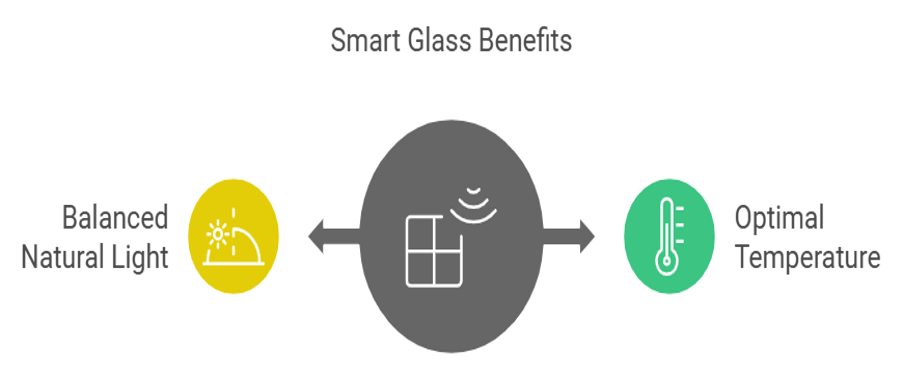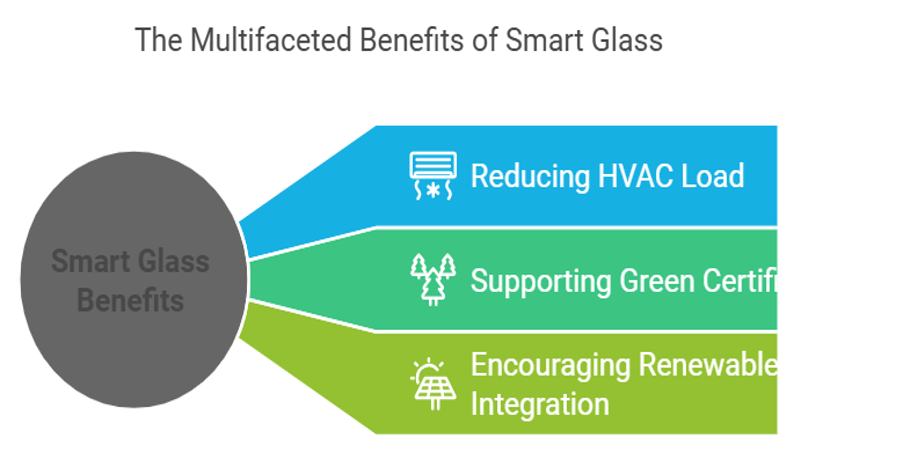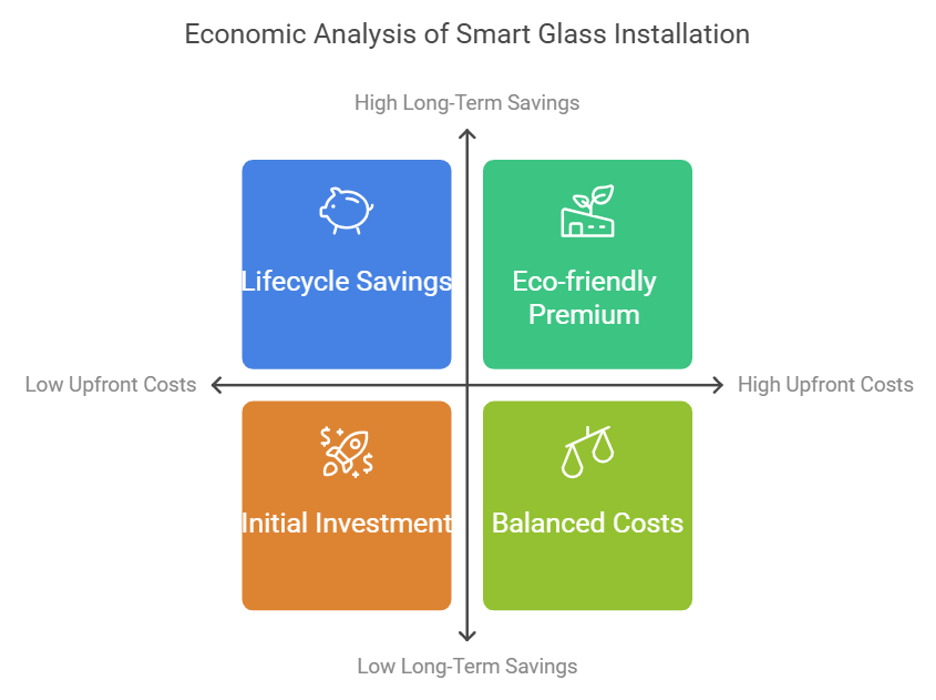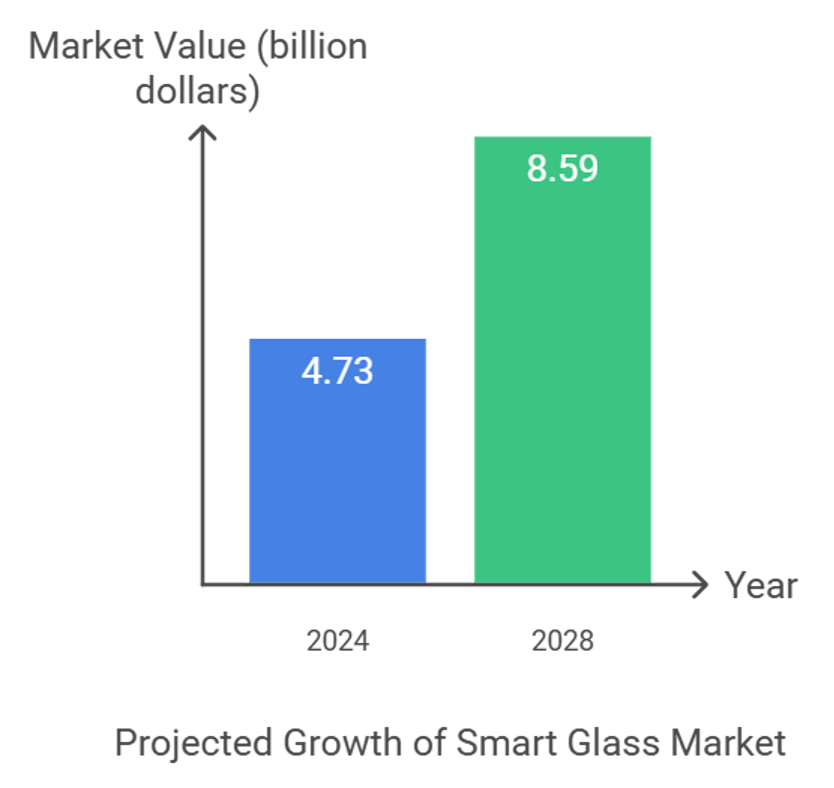The Role of Smart Glass in Sustainable Architecture Projects in Dubai
Introduction
Dubai’s skyline is a testament to the city’s ambition, a blend of futuristic designs and sustainability-driven architecture. But with towering glass structures under the relentless desert sun, architects face a challenge: how to balance aesthetics with functionality and sustainability? The answer lies in smart glass, a game-changing innovation that’s transforming Dubai’s architectural landscape.
Let’s dive into how smart glass is redefining sustainable design, explore its role in a real-life Dubai project, and understand why it’s a must-have for modern architecture.
Setting the Scene: The Need for Sustainable Architecture in Dubai
Imagine this: a sleek glass skyscraper shimmering in the sunlight, exuding luxury and modernity. But inside, air conditioners are working overtime, struggling to keep the space cool. This energy-intensive reality has long been a challenge for Dubai’s architectural marvels, given the region’s scorching heat and high energy consumption.
In a city that aims to lead in sustainability, aligned with its Dubai Clean Energy Strategy 2050, such inefficiencies are no longer acceptable. Architects and developers are turning to innovations like smart glass to meet ambitious green building standards without compromising design.
Why Smart Glass is a Game-Changer for Sustainability
- Smart glass can reduce energy consumption by 20–30%, thanks to its ability to control heat and light transmission. By minimizing the need for air conditioning and artificial lighting, it slashes electricity bills and carbon footprints.
- Smart glass adapts to external conditions, maintaining optimal indoor temperatures without manual adjustments.
- Natural light is essential for well-being, but too much can lead to glare and overheating. Smart glass provides the perfect balance, allowing maximum daylight while reducing glare.
- Designed for harsh conditions, smart glass thrives in Dubai’s heat, making it a durable and sustainable choice for long-term projects.

Case Study: Skyscraper, Dubai
When the skyscraper was conceptualized, it was meant to be more than just another addition to Dubai’s skyline. The goal? To create a landmark that combined cutting-edge design with environmental responsibility.
The Challenge
The developers faced two significant challenges:
- Designing a striking glass façade that offered panoramic views of the city.
- Ensuring the building met LEED Gold Certification standards for sustainability.
The Solution: Enter Smart Glass
To achieve their vision, the project team chose to integrate smart glass across the tower’s exterior. Here’s how it played a pivotal role:
- Dynamic Tinting Technology:
The glass automatically adjusted its tint based on sunlight intensity, reducing heat gain by 40% and cutting cooling energy demand significantly. - Enhanced Occupant Comfort:
Offices and apartments in the tower enjoyed glare-free views, optimal natural light, and a consistent indoor temperature—creating a luxurious yet eco-friendly living and working environment. - Energy Savings:
Over the course of the first year, the tower reported a 25% reduction in electricity costs, compared to similar buildings without smart glass. - Long-Term Value:
The use of smart glass contributed to the Skyscraper’s high market value, attracting environmentally conscious tenants willing to pay a premium for sustainability.
How Smart Glass Aligns with Dubai’s Vision for Sustainability
Dubai has set bold goals to reduce energy consumption by 30% by 2030 and achieve net-zero emissions by 2050. Smart glass plays a critical role in meeting these targets by:
- Reducing HVAC Load: Cooling accounts for up to 70% of energy use in Dubai buildings. Smart glass significantly reduces this load.
- Supporting Green Certifications: Smart glass helps projects qualify for certifications like LEED and Estidama.
- Encouraging Renewable Energy Integration: By optimizing energy usage, buildings equipped with smart glass can better integrate renewable energy solutions like solar power.

The Cost of Smart Glass: Investment or Expense?
While smart glass is often seen as a premium feature, its benefits far outweigh the initial cost:
- Upfront Costs:
Installing smart glass in a mid-sized building can cost 15–25% more than traditional glass. - Long-Term Savings:
Reduced energy bills, increased property value, and longer material lifespan save building owners 30–50% over the lifecycle of the building. - Enhanced ROI:
Tenants are increasingly willing to pay a premium for eco-friendly features, offering developers a faster return on investment

Integrating Smart Glass into Your Sustainable Project
Thinking about incorporating smart glass into your next project? Here’s how to get started:
- Consult the Experts:
Work with suppliers and architects experienced in smart glass integration. - Choose the Right Technology:
From electrochromic to thermochromic options, select the type of smart glass that aligns with your project’s goals. - Plan for Maintenance:
Proper cleaning and periodic inspections ensure smart glass continues to perform optimally in Dubai’s challenging climate.
Numbers to look out for:
- Energy Efficiency: Buildings with smart glass use up to 30% less energy for cooling and lighting.
- Market Growth: The global smart glass market is expected to grow from $4.73 billion in 2024 to $8.59 billion by 2028, driven by demand for sustainable construction.
- Dubai’s Green Building Rules: All new buildings in Dubai are required to comply with green building regulations, making smart glass an increasingly popular choice.

The Bigger Picture: Building a Greener Dubai
The Skyscraper is just one example of how smart glass is shaping the future of architecture in Dubai. By integrating this technology, architects and developers are not just creating stunning buildings, they’re contributing to a more sustainable city.
Smart glass represents a shift towards smarter, greener, and more efficient design practices. And as Dubai continues to grow, innovations like these will play a vital role in achieving the city’s environmental goals.
In a city known for its ambition and innovation, smart glass is more than a trend, it’s a necessity. By reducing energy consumption, enhancing occupant comfort, and aligning with sustainability goals, it’s paving the way for a new era of architecture in Dubai.
Whether you’re planning a skyscraper or a smaller project, incorporating smart glass is an investment in the future. Ready to make your mark with sustainable design? Let’s create something extraordinary together.
Curious about how smart glass can elevate your next project? Contact us today to explore tailored solutions for your sustainable architecture needs.
FAQs: Everything You Need to Know About Smart Glass in Sustainable Architecture
Smart glass reduces energy consumption by controlling heat and light transmission, minimizing the need for air conditioning and artificial lighting. This helps lower carbon footprints and aligns with green building standards.
Absolutely! Smart glass is designed to handle extreme heat and intense sunlight. Its durability and UV-resistant properties make it a perfect choice for Dubai’s unique environmental conditions.
There are various types, including:
- Electrochromic: Changes tint with an electric current.
- Thermochromic: Adjusts tint based on temperature.
- Photochromic: Reacts to sunlight intensity.
Smart glass can be 15–25% more expensive upfront but offers significant long-term savings through reduced energy bills and increased property value.
Smart glass needs regular cleaning with a microfiber cloth and non-abrasive cleaners. Annual inspections of electrical components are recommended to ensure optimal performance.
Yes, smart glass contributes to energy efficiency, a key factor in certifications like LEED and Estidama. It also enhances thermal comfort and daylighting, further supporting green building goals.
With proper care, smart glass can last 15–20 years. Regular maintenance ensures it continues to perform optimally in harsh climates like Dubai’s.
Yes, smart glass can be retrofitted, though it’s more cost-effective to integrate it into new constructions. Retrofitting typically increases project costs by 15–30%.
Our firm combines years of expertise with cutting-edge technology to deliver high-quality smart glass tailored to your needs. We offer end-to-end solutions, from consultation and installation to maintenance, ensuring your project meets sustainability standards without compromising on style.
Yes, we pride ourselves on exceptional customer service. Our team offers comprehensive after-sales support, including regular maintenance, troubleshooting, and professional advice to ensure your smart glass performs optimally for years to come.
Innovative Smart
Glass Features
Energy Efficiency
How Does Smart Glass Improve Your Experience In Homes?
Smart glass renders instant privacy at the touch of a button while pouring in the natural light to illuminate your living settings. Visit your nearby store or explore our website to stay updated about the latest trends in smart glass.



